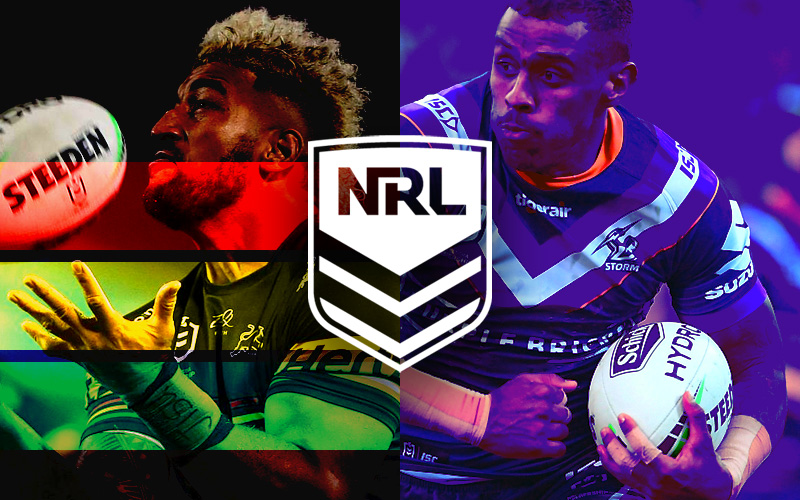Rugby League betting
Rugby League betting can be down all over the world, although it is undoubtedly more popular in places like Australia, New Zealand, England, Papua New Guinea and Tonga. Rugby League betting is commonly done on competitions like the NRL and Super League, although if it’s a professional match, there is every chance betting sites will feature odds surrounding it. Rugby League at an International level culminates every four years with the Rugby League World Cup. Below the WGL team will run you through everything you need to know to bet on rugby league.
How to bet on rugby league
Rugby League betting can be done in Australia via regulated online bookmakers, with many major sports betting sites having a base there. Major online bookmakers accepting bets on the NRL include Sportsbet, Ladbrokes and PlayUp.
Readers not native to Australia will need to abide by local laws, when betting online. For instance, New Zealand have very few laws governing where they can bet. This means Kiwis can wager on the NRL at various overseas-based betting sites, or via the local TAB.
Most betting sites globally have markets for various rugby league competitions year-round. But without a doubt much of the focus is on the Australian NRL and the UK’s Super Rugby competition.
To get started betting on rugby league, you will need to choose an online bookmaker, with the options in the table our preferred bookies. You will then need to fund your account, which can be done via many different means, but Visa and Mastercard is accepted.
Most of the top rugby league betting sites will have apps available to download, with these often available on Android and iOS smartphones and tablets. Huawei with their HarmonyOS operating system is also making inroads, but few companies have created betting apps for these smartphones.
Below we will run you through some of the key things you should understand when betting on rugby league, including how the scoring works, why some bet types are for mugs, and give you a brief run-down of the major competitions you can wager on.
Rugby League betting in 2025
Rugby league began as a working-class spin-off from rugby union and remains a giant among sports in places including the north of England, New South Wales and Queensland, Papua New Guinea and New Zealand.
Clubs in the north of England broke away from rugby union in 1895 in a dispute over player payments and quickly evolved their own rules in an attempt to keep the game flowing.
The 13-a-side game has great television appeal and attracts huge viewing numbers through its two leading competitions, the National Rugby League (NRL) in Australia/New Zealand and Europe’s Super League.
It is considered among the most brutal of sports, with huge collisions between 100-kilogram-plus players also blessed with agility and speed. And unlike in American football, there are no crash helmets and usually little padding elsewhere.
Points are scored by scoring tries (touching the ball down in the in-goal at the end your team is attacking), by converting those tries (kicking the ball between the uprights and over the crossbar from a kicking tee) or kicking penalty goals (same scenario as conversions). Tries are worth four points and conversions and penalties two each. One point can also be scored by kicking a field goal in general play (a drop kick between the uprights and over the crossbar).
Brief history of rugby league
The birth of rugby league came about essentially thanks to a north-south divide in England in rugby union in the late 19th century.
The ruling body of rugby, the RFU, would not be swayed from its amateur principles, meaning clubs could not pay players who needed to miss work to play. This mostly affected the northern clubs, who drew players from the mines and mills of the region.
The RFU also banned rugby at grounds where an entrance fee was charged, so the breakaway North Rugby Football Union was formed and rapidly attracted many disaffected clubs and players. Within a dozen years the rules of the new competition began to evolve, including the reduction to 13 a side and the introduction of the play-the-ball after every completed tackle.
By the 1950s the new game was attracting massive crowds in the north of England and also in Australia, where a similar split from rugby had taken place early in the 20th century.
The game has gone from strength to strength since, with TV changing the face of the game in the 1990s with huge sums being paid for broadcast rights.
Why League is better than Union
Lovers of league say the rules make it much more free-flowing than rugby union and the fact it’s 13 a side rather than 15 leaves extra space for attack, with far less scope for play to descend into an ugly, stop-start scrap.
Also, the six-man (usually) uncontested scrums aren’t as time-consuming as those of union, which can often be reset two or three times and eat up precious minutes.
The viewing figures (outside New Zealand at least) indicate it’s a much more popular game for the masses.
Plus it can point to its reputation as the game for the working class and is not seen as an elitist amateur game for the professional class, as rugby was often derided as before its conversion to full professionalism.
Rugby League bet types
Rugby league is a great medium for the gambler (thanks to wide television coverage of the top leagues, the NRL and Super League) and there is no shortage of betting options for each game and also for longer-term outcomes.
Out preferred bookmakers and sports book offer at the very least the following outcomes on each top-grade match.
- Head to head: A straight-up bet, simply pick the winner.
- Points start (line): Same as above but factor in the line set by the bookmaker. Ie, if Team A is handicapped as -5.5 points they must win by 6 or more for the bet to be a winner.
- Half-time/full-time double: Select who will lead at half-time and again at full-time. Can add some value to a short-priced favourite.
- Total match points: Simply select over or under the total set by the bookies. A good bet if you are unsure who will win but expect a high- or low-scoring clash.
- Total match tries: Similar concept to total match points but takes out the vagaries of goal-kicking.
- First try-scorer: Need plenty of luck for this one; simply pick the player you expect to score the first try and cross your fingers.
That is just a taste of the vast range of bet types available on league matches, not to mention the season-long types including premiership-winning team and leading try-scorer, points-scorer, award winners etc.
Best competitions for betting on rugby league

NRL
Considered rugby league’s premier competition, the National Rugby League includes 16 teams (15 from Australia and one from New Zealand).
The competition kicks off each March and the finals series consisting of the top eight teams is held in September/October. The grand final is played in Sydney and is one of the best-attended sporting events of the Australian sporting calendar.
Another highlight of the season is the State of Origin series held between Queensland and New South Wales. The best-of-three series attracts massive interest from fans and punters, probably even surpassing the NRL grand final in the eyes of many Australian fans.
NRL betting can be done all year round, but definitely ramps up when in-season and is also most popular in home country, Australia.
Super league
The premier competition in the northern hemisphere contains 12 teams (11 from England and one from France).
The competition switched from a winter to a summer competition in 1996, with the season starting in February and culminating in July. Like the British football leagues, the competition features relegation battles, involving the bottom four teams in the Super League and top four in the second-tier Championship.
The Challenge Cup is a separate knockout competition involving teams from all levels of league in Britain and has been held since 1896. Teams from Europe can also take part and the final is held at Wembley Stadium in August.
General tips for betting on rugby league
Just like any gambling pursuit, rugby league betting is tough to nail, but undoubtedly if you follow some simples tips or rules when placing bets, you can greatly increase your chances of winnings.
- First try-scorer bets for fun only: Yes, the odds are enticing compared with the skinny odds for a team simply winning a game, but the reality is first try-scorer bets are only of novelty value. It’s nigh on impossible to say with any accuracy which player will score first … you are taking pot luck. Having said that, it can be a fun bet to have among friends and to add spice to the start of a game.
- Keep an eye on the spine: By spine we mean the positions of hooker, halfback, five-eighth and fullback. Or numbers one, six, seven and nine. These are the playmakers and if one or more of the regular players in these positions for any team is missing, it can have a marked effect on the team’s performance. Look for a team who has a star returning in these positions to improve quickly.
- Avoid the quick back-up: Steer clear of wagering on teams which are playing again after only a four- or five-day break. Rugby league is an incredibly physical game and that usually is not enough time for teams to recover and be at their best again.



